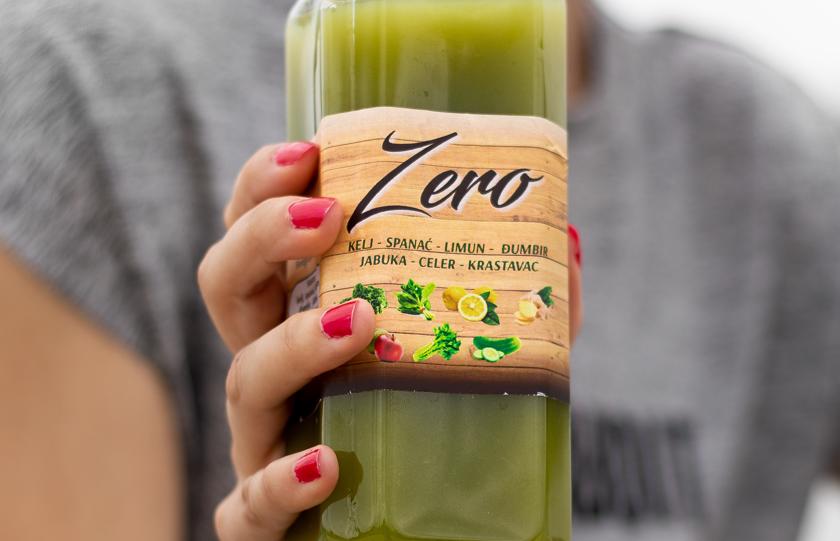
Detox juice cleanse - healthy or not?
I’m sure you’ve noticed this very popular nutrition trend for body detox – juice cleanse. The idea is that it is better to consume fresh squeezed juices instead of whole fruits and vegetables, since the nutrients are better and faster absorbed, and they aid the gut by letting it rest from digesting fibres. During this kind of detox program, fruit juices often replace whole meals.
Sounds good doesn’t it?
Well, maybe it is not that good as you think. I’m going to explain why you should be careful if you decide to follow this program, in order to avoid negative health consequences.
Our body has a perfectly designed detox system. Our liver, kidneys, skin etc. are doing their job nicely and there is no evidence that detox juice cleanse is making it better.
I will talk more about the body detoxification some other time.
For our body to function normally, it needs an adequate daily intake of proteins, fats and carbohydrates. If you drink, mostly five, fruit juices instead of having regular meals, you cannot have a good balance of nutrients during the day. The juice itself is not nutritionally well-balanced because it does have enough carbs, but there isn’t enough proteins and fats.
Additionally, the juices lack fibres. Throughout the processing, the juice is squeezed from fruits and vegetables, and the remaining meat and fibres are removed. When you eat whole fruits and vegetables, fibres break down in your body, which also helps the regulation of blood sugar. Slower breakdown slows down the absorption of sugar into the bloodstream, and the body has more time to absorb healthy substances, vitamins and minerals. Fibre-free juices can lead to a sudden spike in blood sugar and insulin.
Also, processing fruits and vegetables reduces the content of certain antioxidants, because they are often bound to fibres.
Whole fruits and vegetables, and fresh juices have a lot of sugar, the difference is in the type of the sugar. Whole fruits have sugar that exists in its cellular structure and it is not absorbed so quickly. Free sugars found in the squeezed juices are not bound in the cell and therefore their absorption is much faster.
Another reason why drinking juices is not that great is the satiety. When you eat the whole fruit and vegetable you will feel more full, compared to just drinking liquid juice and feeling less satiated.
Should you completely stop drinking fresh juices? No.
These juices can be good addition to an already balanced diet, increasing the intake of nutrients from fruits and vegetables.
They are a good choice for people who do not like to eat fresh fruits and vegetables, especially for people who have some kind of a health problem where the use of certain fruits or vegetables can help. For example, cranberry juice is excellent against urinary tract infections or chokeberry (aronia) and beetroot juices which improve lower iron level, etc.
Also, fruits and veggies are full with water, so if you don’t drink enough of water throughout the day or you have a hard time drinking water because you don’t like the taste, you can make a juice.
What is the best way to make fresh squeezed juice?
The juice can be made by squeezing manually, blending or squeezing in a juicer (centrifugal and cold press).
Centrifugal juicer works by rotating the plate with the knives inside the juicer at high speed, which grinds fruits and vegetables. Centrifugal force separates the juice from the solid residue.
The cold-press (masticating) juicer slowly presses and squeezes the fruits and vegetables in order to squeeze all the juice there is. The pulp is strained and the juice is filtered.
It is best to drink juice from a blender, because after processing, the pulp and skin of fruits and vegetables are retained.
Here is some advice for you concerning juice intake.
If you are used to drinking sweet beverages, vegetable juices can be really unappetizing. Instead of adding a lot of sweet fruit or sugar, you should try adding lemon juice, fresh mint, ginger root, cinnamon or a teaspoon of homemade honey.
Every juice should include vegetables, for example spinach, kale, celery. As for fruits, you should use no more than 3 different kinds of fruit. Also, add some healthy fat foods, almonds, walnuts, hazelnuts, flex seeds, chia seeds. Hemp seeds are great if you want to add some more protein in your diet.
If the juice is too sweet, feel free to add some still water. You can also add a bit of ice if you like colder drinks.
You should drink the juice as soon as you make it. Toxic bacteria can develop in freshly squeezed juice if it stays for a long time, even if it is put in a fridge. If you buy juice in a store, choose a juice that is pasteurized (make sure it doesn’t have added sugar), although it is always better to make fresh juice.
People with diabetes and insulin resistance must carefully choose the foods from which they make juices, due to possible spikes in blood sugar.
It is better for your health if you choose to consume whole fruits and vegetables, with a high fibre content. As for the squeezed juice, I recommended not to drink more than 1-2 glasses (200-500 ml) per day.
In case you are taking any medication, avoid grapefruit juice. This fruit interacts with most medications, including blood thinners, antidepressants, cholesterol medications, and blood pressure medications. Grapefruit contains furanocoumarins, which often block or increase the effect of these medications.
Don’t replace your meals with fruit juices, so you can lose weight! Your calorie intake is going to be reduced and it can give you good results, but that is only temporary because this way your metabolism slow down. After some time, you will gain weight again. If you want to lose the weight you need to have enough meals and proper calorie intake throughout the whole day!
Listen to your body, see how you feel after drinking juices and carefully choose which fruits and vegetables you are going to use, especially if you have some health issues.
